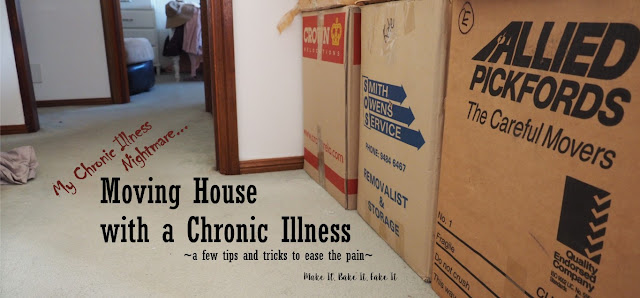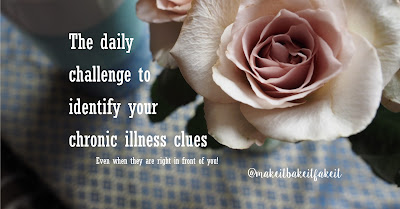“It is with deep regret that I need to inform you…” Tears well in my eyes. The email from the landlord/rental agent confirms my absolute worst nightmare since being sick with a chronic illness. I have to move. AGAIN! This will be the fourth time since getting sick that I need to move.
Yes, moving is a normal life event. I get it, it happens. But when you have a chronic illness this process and the emotional, mental and physical toll it takes on you cannot be comprehended. The last time I moved it took months. Yes, months for my body to recover.
Why the toll? Well there is the physical toll of course…you have to pack things, sort things, move things, collect things, go to open houses and arrange inspections. And clean! So much cleaning! (Something I would normally avoid on a good day at the best of times!) Then there is the cognitive toll, the planning, the lists, the trawling of the real estate sites, the copious amounts of information that needs to be entered into applications, organising moving trucks, redirecting mail and making calls to change the utilities. Then there is the mental check list that goes around and around and around your head. Each time I awoke last night a mental checklist of all the things that needed to be done whirled around and around my head. This cognitive exertion is as bad and even worse at times than the physical. Then the emotional. The stress. Will it get done? How is my body going to cope? And the guilt…can I possibly ask that person to help…Again?!?
All of this is running around my head at the moment because last week I received that email. And so next week, we are moving. It has been less than 2 weeks since I received that email, and already my body has had enough. Despite my best efforts to limit steps, and pass on responsibilities, this body of mine has crashed, and I have spent the day moving from bed to couch...my brain so fried that I could not even follow an episode of Scandal.
Moving with a chronic illness is tough. I thought I would share some tips that I have formulated over the past few moves. The list is not perfect, and hey, I am hopeless at following my own advice...but here goes...
However, as for most people, the onset of a chronic illness means a dramatic change in financial status, ability to self care and increasing medical expenses and requirements, so moving is inevitable...whether that be finding somewhere cheaper to live, back in with family, or closer to medical services. In the 4 years I have had chronic fatigue syndrome I have moved 4 times. Four times of packing up a whole house and moving. So, as the moving process is probably inevitable…keep reading below.
Aim for packing one box a day. If you have the energy, aim for two. Focus on the messy personal areas…bedroom, office, where you can cull and sort at the same time. Save the kitchen, the DVD collection, the bookshelves etc for friends and family who offer to help. And if they don’t offer to help, host a packing party…order pizza, tell your friends you need the help and direct them to the kitchen.
Write a few good to-do lists for moving administration, packing and cleaning. That way, you have the satisfaction of striking things off a list, you can also clear the muddled millions of to-do actions running around your head. It is also handy for when you have others help you, they can check what needs doing and just do it, with out needing to bother you with needless questions.
3. Invest in good strong friends and family
I am thankful I have a bunch of friends who have muscles…one reason to stay in contact with the fitness mad friends I used to exercise with! I am also thankful that I am a part of a caring Christian church community, where people help each other move all the time, and don’t think twice about it. I always feel guilty to ask. But am thankful for people around me who just offer. It is also a challenge to not feel offended when people cannot help. Many people are busy and have many commitments, some may not be able to help on moving day, but may offer meals, packing help, cleaning or unpacking assistance. Sometimes it is hard to find a strong support network, especially when living a life of chronic illness which is very isolating. Don't be afraid to reach out to community organisations, friends or family to see if they can help, or point you in the direction of someone who can.
4. Buy a heap of strong plastic tubs
Yes, moving is a normal life event. I get it, it happens. But when you have a chronic illness this process and the emotional, mental and physical toll it takes on you cannot be comprehended. The last time I moved it took months. Yes, months for my body to recover.
Why the toll? Well there is the physical toll of course…you have to pack things, sort things, move things, collect things, go to open houses and arrange inspections. And clean! So much cleaning! (Something I would normally avoid on a good day at the best of times!) Then there is the cognitive toll, the planning, the lists, the trawling of the real estate sites, the copious amounts of information that needs to be entered into applications, organising moving trucks, redirecting mail and making calls to change the utilities. Then there is the mental check list that goes around and around and around your head. Each time I awoke last night a mental checklist of all the things that needed to be done whirled around and around my head. This cognitive exertion is as bad and even worse at times than the physical. Then the emotional. The stress. Will it get done? How is my body going to cope? And the guilt…can I possibly ask that person to help…Again?!?
All of this is running around my head at the moment because last week I received that email. And so next week, we are moving. It has been less than 2 weeks since I received that email, and already my body has had enough. Despite my best efforts to limit steps, and pass on responsibilities, this body of mine has crashed, and I have spent the day moving from bed to couch...my brain so fried that I could not even follow an episode of Scandal.
Moving with a chronic illness is tough. I thought I would share some tips that I have formulated over the past few moves. The list is not perfect, and hey, I am hopeless at following my own advice...but here goes...
Moving House with a Chronic Illness
1. DON'T! Avoid moving at all costs!
However, as for most people, the onset of a chronic illness means a dramatic change in financial status, ability to self care and increasing medical expenses and requirements, so moving is inevitable...whether that be finding somewhere cheaper to live, back in with family, or closer to medical services. In the 4 years I have had chronic fatigue syndrome I have moved 4 times. Four times of packing up a whole house and moving. So, as the moving process is probably inevitable…keep reading below.
2. Start planning early
Aim for packing one box a day. If you have the energy, aim for two. Focus on the messy personal areas…bedroom, office, where you can cull and sort at the same time. Save the kitchen, the DVD collection, the bookshelves etc for friends and family who offer to help. And if they don’t offer to help, host a packing party…order pizza, tell your friends you need the help and direct them to the kitchen.
Write a few good to-do lists for moving administration, packing and cleaning. That way, you have the satisfaction of striking things off a list, you can also clear the muddled millions of to-do actions running around your head. It is also handy for when you have others help you, they can check what needs doing and just do it, with out needing to bother you with needless questions.
3. Invest in good strong friends and family
I am thankful I have a bunch of friends who have muscles…one reason to stay in contact with the fitness mad friends I used to exercise with! I am also thankful that I am a part of a caring Christian church community, where people help each other move all the time, and don’t think twice about it. I always feel guilty to ask. But am thankful for people around me who just offer. It is also a challenge to not feel offended when people cannot help. Many people are busy and have many commitments, some may not be able to help on moving day, but may offer meals, packing help, cleaning or unpacking assistance. Sometimes it is hard to find a strong support network, especially when living a life of chronic illness which is very isolating. Don't be afraid to reach out to community organisations, friends or family to see if they can help, or point you in the direction of someone who can.
4. Buy a heap of strong plastic tubs
These tubs are not much more than the cost of moving boxes...but they can be easily accessed and can store all the things you don't use regularly...and they are ready to go for next time you need to move. Write clearly on the sides so that they can be stored in a garage or shed and quickly located when required. I have found that in the time I have been unwell I have also left two teaching jobs, and so I have loads of teaching resources I have not had the time or the energy to sort yet, and so they are sitting in tubs waiting patiently for the day I return to work. At least with the tubs, they are waterproof and easy to pick up and move to the next location. Whilst on this topic of waterproofing…I have had multiple garages flood on me…so plastic is best! Also add some damp rid products in the area where you are storing to draw away moisture, and raise things up on bricks.
5. Escape on moving day.
5. Escape on moving day.
Run far, far away...which I know has probably been your aim since the moment you heard you were needing to move...anything to escape this nightmare. However, truly there are some things you need to let go and let others deal with. I find this so hard! This is my aim for our next moving day. I have stated it already. Whether I am able to let go and not hold onto the control I so naturally hold, will be another issue. But that is the aim.
If disappearing is not possible, develop clear contingency plans. Have a chair ready to sit on at the new location. Stick up Post-It notes where you want certain items of furniture to go. Have all your bedding ready to go and be made up on your bed as one of the first priorities. Don't be afraid to walk away and take time out. Drink lots of water. Pack your medications to stay with you on the day. Have plenty of snacks available.
6. Trust.
If disappearing is not possible, develop clear contingency plans. Have a chair ready to sit on at the new location. Stick up Post-It notes where you want certain items of furniture to go. Have all your bedding ready to go and be made up on your bed as one of the first priorities. Don't be afraid to walk away and take time out. Drink lots of water. Pack your medications to stay with you on the day. Have plenty of snacks available.
6. Trust.
Trust that there are others around you that can help. Trust the process. Write a list and walk away. Trust the Lord… He has you. He holds you...and each of your worries! A friend shared this with me recently when I shared my moving house fears...
"Have I not commanded you? Be strong and courageous. Do not be afraid; do not be discouraged, for the Lord your God will be with you wherever you go.”
Joshua 1:9 (NIV)
Moving house is not easy...on so many levels. All the best...my thoughts (and prayers) are with you wherever you are going through this. If you are reading this and don't have a chronic illness, I hope that this will encourage you to support and have a deeper understanding of how something like moving so deeply impacts those you know with a chronic illness.










